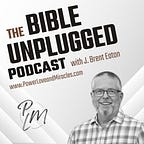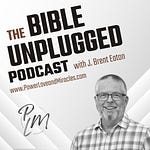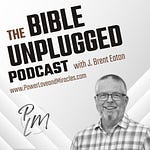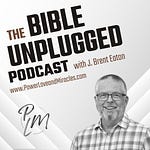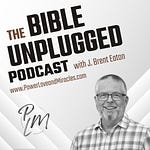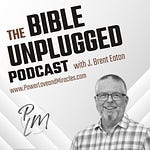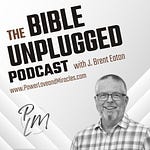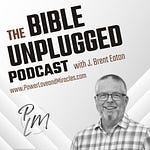Introduction
• From the garden arrest to the empty tomb, John’s Gospel presents the final days of Jesus not just as historical events – but as the climax of a much older story.
• I'm Brent, and this is episode 37 of The Bible Unplugged. In this episode, we continue our Easter Unplugged series with a deep dive into how John chapters 18 through 21 are filled with Old Testament echoes, symbols, and fulfillments.
• Please take a moment to check out the show notes at PowerLoveandMiracles.com under the Podcast tab for scripture links and study resources.
Why John Is Different
• In this series we’ve focused on how John is different. Matthew, Mark, and Luke focus on what happened. John focuses on what it means. He weaves the passion and resurrection story with themes from Genesis, Exodus, the Psalms, and the prophets.
• In John, Jesus isn’t just giving up his life. He’s fulfilling a very sacred pattern, from Passover lamb to temple priest to the new Adam.
• Let’s walk through some of the key events and uncover the ancient layers underneath all this.
Jesus Arrested in a Garden
• In John 18, Jesus is arrested in a garden across the Kidron Valley. That small detail has a wealth of meaning:
• In Genesis chapter 3 Adam and Eve disobeyed God in the Garden of Eden.
• 2 Samuel 15, where King David crossed the Kidron valley weeping when his son betrayed him.
• When Jesus crossed the Kidron Brook on his way to the garden, the brook carried the blood of the lambs who had been sacrificed in the Temple. This echoes Jesus as the ultimate Passover lamb.
• When the soldiers arrived and said they were looking for Jesus of Nazareth, Jesus says, “I AM he”—echoing the divine name from Exodus 3. John wants us to know that Jesus is no helpless victim. This is the I AM who surrendered willingly, just as the Passover lamb was brought to slaughter in the Temple.
Peter’s Denial in the Courtyard
• While Jesus is interrogated inside, Peter stands outside by a coal fire and denies knowing Jesus three times. The location is ironic. This is the high priest’s courtyard. Peter is failing his priestly moment.
• And that rooster crowing? It was more than a wake-up call. In the temple, the rooster crow marked the changing of the night watch. A new day was breaking – piritually and literally.
• Jesus would later restore Peter by a coal fire by having Peter confess his love for the Messiah three times.
Trial Before Pilate
• After Jesus is interrogated by the Jewish leadership they bring him before Pilate, the Roman Governor.
• Pilate interrogated Jesus on what John calls the Day of Preparation – when lambs were being inspected for sacrifice. Pilate declares, “I find no fault in him,” unknowingly confirming Jesus as the spotless Passover Lamb.
• Even the mocking of Jesus – the robe, the crown of thorns – fulfills Psalm 2, where kings and rulers rage against God’s anointed.
• John isn’t just recounting the cruelty. He’s unveiling a universal coronation of the Messiah.
Crucifixion: Fulfilled to the Letter
• We come to the crucifixion account in chapter 19. This is a masterclass in prophecy:
• Soldiers cast lots for Jesus’ tunic, fulfilling Psalm 22.
• The tunic, made of one piece, matches the robe of the high priest from Exodus 28.
• Jesus on the cross says, “I am thirsty,” fulfilling Psalm 69, and is offered vinegar on hyssop – the same plant used to apply Passover lamb’s blood.
• No bones are broken, fulfilling Exodus 12 and Psalm 34.
• A soldier pierces his side, echoing Zechariah 12:10.
• John ends with Jesus saying, “It is finished” meaning Jesus is not just “done,” but “fulfilled, completed.”
• This is the final sacrifice. The Lamb, the Priest, and the Temple have all come together in Jesus.
The Empty Tomb: New Creation Begins
• Chapter 20 opens with Mary Magdalene discovering the empty tomb on the first day of the week. That’s creation language. Genesis 1 begins the same way, and God is beginning a new creation.
• John is telling us: this is not just a resurrection. It’s a new beginning. The curse of death has been reversed. Jesus, the new Adam, is walking in a garden again.
Mary and the Gardner: A New Eve
• Mary sees Jesus but mistakes Him for a gardener. That’s not a coincidence. The first woman, Eve, was in a garden but encountered a serpent and brought death. Now, Mary meets the risen Jesus and receives the message of life.
• She did not recognize Jesus until he says one word, “Mary.” In the Gospel of John chapter 10, Jesus says, “My sheep hear my voice, and I know them, and they follow me.” This echoes what we read in Psalm 23: Yahweh is my shepherd; I shall lack nothing.”
• Jesus then tells Mary not to cling to Him. Why? Because He’s not returning to the old life. He’s ascending, and so is His mission.
• And then Jesus commissions Mary to tell the others. In that moment, Mary becomes the first apostle of the resurrection. A woman. A formerly broken woman. The curse that happened in the garden of Eden has been redeemed.
Thomas and the Wounds of God
• Eight days later, Thomas meets the risen Jesus and demands proof. Jesus shows him the scars – the wounds that Jesus carried from his brutal death.
• Thomas touches the wounds and proclaims, “My Lord and my God!” This is the climactic confession of the Gospel.
• Jesus responds, “Blessed are those who have not seen and yet believe.” This sounds like Jesus is speaking directly to us today. John is writing this Gospel, so we’ll be counted among the blessed.
What Do We Learn From This?
• Every thread from the Old Testament – sacrifice, priesthood, temple, kingship, exile, return, and covenant – finds its fulfillment in Jesus.
• He is the Lamb who takes away the sin of the world.
• He is the High Priest who offers Himself.
• He is the King who suffers to reign.
• He is the Gardener who tends a new creation.
• When you see your life as chaotic or unfinished, remember what Jesus said: It is finished. Jesus’ sacrifice gave us the freedom to live a complete life. Jesus’ death was not the end of life, but the beginning of something new.
• The greatest lesson learned throughout the death, burial, and resurrection of Jesus is that God is in control even when we think the world is coming to an end.
What do we do with this?
• When Mary saw Jesus in the garden she held on to him out of a mixture of emotions. She held on to his body, but she also held on to her image of Jesus before the crucifixion. Jesus gently challenged her to let go of her old conceptions. Reflect on where you might still be clinging to an old version of Jesus. Like Mary, He calls you to a new mission.
• Jesus carried the scars from his brutal crucifixion with him in his resurrected body so that Thomas would have a way to believe Jesus was back. Ask yourself: What scars in your life might God use to bring someone else to faith?
• God shows us that He is in control of history as well as current events. This week, read through John chapters 18-21 again. As you do, consider what you read through the lens of the Old Testament. What do you notice that is new to you? What other stories are being retold in a way that shows God redeemed history. The ultimate question is, how is God redeeming your history and bringing you closer to Him?
The conclusion
• And the music says my time is up for this episode, but I’ll be back with much.
• I hope this has been helpful. If so, give this podcast a high rating and share it with others.
• In the next episode we will look at a passage in the book of Philippians where the Apostle Paul lays out a pathway to living a life of peace.
• My prayer for you is that as you will see how God consistently wove together the threads of history throughout the Bible to bring you to a knowledge of your eternal future that God designed just for you.
• Have a blessed week.
The disclaimers
• Just to let you know
• All opinions are my own. If you agree, keep listening. If you don’t… keep listening, I might surprise you with something you didn’t know.
• All Bible quotations come from the World English Bible which is a public domain work.
• Our show theme song is “Awesome Call” by Kevin MacLeod and is available under a Creative Commons license.
• The content of this podcast is copyrighted 2025 by J. Brent Eaton
• This has been a Power Love and Miracles production.

